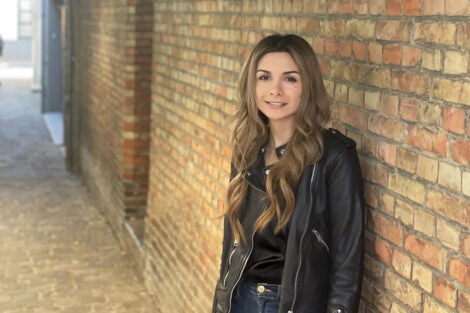A health crisis drove Sherri Cuffe, MPH ’23, to investigate the impact of nutrition and exercise on quality of life
May 19, 2023—Sherri Cuffe never worried much about her health until about ten years ago, when she suddenly became very ill. She was bedridden and in pain for months as doctors worked to figure out what was wrong. When she was finally diagnosed with multiple autoimmune disorders including celiac disease, Cuffe set about learning how she could improve her quality of life through food and exercise—and later used her knowledge to launch two health-focused businesses. Now, as a graduate of Harvard T.H. Chan School of Public Health, she’s focused on exploring ways that lifestyle changes can help people reduce their risks for age-related diseases.
The seeds for her interest in healthy aging were planted early in her career. Cuffe was a medical technician at an assisted living home while she was an undergraduate at UCLA. There, she worked with multiple residents over the age of 80 and observed the positive effects that social interaction and good nutritional choices had on their health and cognitive abilities.
When Cuffe started experiencing her own significant health challenges several years later, she took a deep dive into the healing potential of lifestyle changes. Her top action item: changing what she ate.
An entrepreneur is born
Cuffe grew up in Los Angeles, as part of a large Persian family with rich culinary roots. Cooking was an important part of her life, but the traditional foods she grew up with tended to be high in less-healthy foods such as red meat. To improve her health, she focused on incorporating more nutritious foods like vegetables and whole grains, while eliminating processed ingredients and those that could exacerbate autoimmune disorders. Not wanting to give up her love of baking, she switched to gluten free recipes, which are recommended for people with celiac disease. These proved to be a hit with friends and family, who encouraged her to start a business.
It had been about a year since her diagnoses, and Cuffe was finally feeling like she was recovering and regaining her strength. The time was right for a new challenge. “I was driven to find a way I could have an impact on the quality of life of others,” she said.
Cuffe launched Cookie Collective in LA in 2015, and offered products that were free of the top eight food allergens, including wheat, peanuts, and dairy. She handled every aspect of the business, including getting her own kitchen commercially certified, developing the recipes, doing all the baking, and making deliveries. She also educated the retailers she worked with around food allergy awareness and the importance of providing healthy alternatives. “It was hard work,” she said, “but the chance to help people who were suffering from allergies and autoimmune disorders like me made it worth it.”
After three years, she decided to close the business and launch a new company focused on Pilates-based physical therapy, a practice she’d found had helped her manage her chronic pain. Through this work, she became interested in not just alleviating symptoms through nutrition and exercise but preventing chronic conditions in the first place. When the COVID-19 pandemic hit and Cuffe was forced to close this business, she decided to take the opportunity to further her studies in nutrition.
A holistic view of longevity
Cuffe chose Harvard Chan School for the opportunity to gain formal research training from accomplished faculty, and to study with students with diverse backgrounds and experiences from around the world. She earned her master of public health (MPH) degree in health sciences, with concentrations in maternal and child health and global health.
For her MPH practicum, Cuffe worked as a research associate with the Oxford Institute of Population Ageing. There, she conducted an analysis of the elderly person’s integrated care system in the UK and identified gaps in the research on aging and lifestyle factors, including nutrition. Her project also explored the impact of intergenerational relationships on quality of life.
Cuffe also worked as a research assistant and exercise trainer at Dana-Farber Cancer Institute while earning her degree. Alongside Christina Dieli-Conwright, associate professor in the Department of Nutrition, she examined how personalized exercise interventions improve cancer outcomes. “This incredible experience led me to a renewed focus on longevity from a holistic point of view,” Cuffe said.
“Sherri exemplifies one of the most inspiring qualities of MPH students: she pulls together experiences and knowledge across many different domains, like her experiences in business and in research, and then combines that with new ideas to move interventions forward,” said her advisor Erica Kenney, assistant professor of public health nutrition. “I’ve learned a lot from her about nutrition and longevity and am excited to see what creative applications she makes for her knowledge in her career—I have no doubt she will have an impact to improve longevity and quality of life for older adults moving forward.”
After completing her coursework this winter, Cuffe moved to Singapore. The country’s life expectancy is among the highest in the world, and the government has been taking action to improve elder care. “It’s an exciting place to be to do longevity research,” Cuffe said. She’s currently exploring options at several biotech companies working in the field.
“In the long term, I hope to become a leader in the longevity field,” she said. “I want to help people around the world improve their quality of life and extend it through nutrition and lifestyle interventions.”
Photo: Courtesy of Sherri Cuffe
